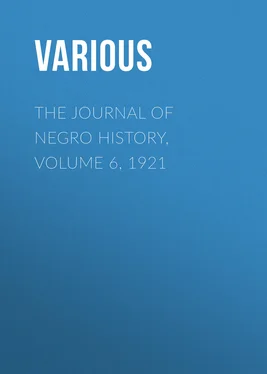Various - The Journal of Negro History, Volume 6, 1921
Здесь есть возможность читать онлайн «Various - The Journal of Negro History, Volume 6, 1921» — ознакомительный отрывок электронной книги совершенно бесплатно, а после прочтения отрывка купить полную версию. В некоторых случаях можно слушать аудио, скачать через торрент в формате fb2 и присутствует краткое содержание. Жанр: foreign_antique, periodic, История, foreign_edu, на английском языке. Описание произведения, (предисловие) а так же отзывы посетителей доступны на портале библиотеки ЛибКат.
- Название:The Journal of Negro History, Volume 6, 1921
- Автор:
- Жанр:
- Год:неизвестен
- ISBN:нет данных
- Рейтинг книги:4 / 5. Голосов: 1
-
Избранное:Добавить в избранное
- Отзывы:
-
Ваша оценка:
- 80
- 1
- 2
- 3
- 4
- 5
The Journal of Negro History, Volume 6, 1921: краткое содержание, описание и аннотация
Предлагаем к чтению аннотацию, описание, краткое содержание или предисловие (зависит от того, что написал сам автор книги «The Journal of Negro History, Volume 6, 1921»). Если вы не нашли необходимую информацию о книге — напишите в комментариях, мы постараемся отыскать её.
The Journal of Negro History, Volume 6, 1921 — читать онлайн ознакомительный отрывок
Ниже представлен текст книги, разбитый по страницам. Система сохранения места последней прочитанной страницы, позволяет с удобством читать онлайн бесплатно книгу «The Journal of Negro History, Volume 6, 1921», без необходимости каждый раз заново искать на чём Вы остановились. Поставьте закладку, и сможете в любой момент перейти на страницу, на которой закончили чтение.
Интервал:
Закладка:
With respect to the moral features of Virginia, it must be observed, that pictures which have been given of them are, to say the least, outrageous caricatures, even when taken from the state of society previous to the Revolution; and that so far as there was any ground or colour for them then, the same cannot be found for them now.
Omitting more minute or less obvious causes, tainting the habits and manners of the people under the Colonial Government, the following offer themselves: 1. The negro slavery chargeable in so great a degree on the very quarter which has furnished most of the libellers. It is well known that during the Colonial dependence of Virginia, repeated attempts were made to stop the importation of slaves, each of which attempts was successively defeated by the foreign negative on the laws, and that one of the first offsprings of independent republican legislation was an act of perpetual prohibition.
With the exception of slavery, these demoralizing causes have ceased or are wearing out; and even that, as already noticed, has lost no small share of its former character. On the whole, the moral aspect of the State may, at present, be fairly said to bear no unfavorable comparison with the average standard of the other States. It certainly gives the lie to the foreign calumniators whom you propose to arraign. 110 110 Letters and other Writings of James Madison , III, 122-124.
To Robert J. Evans (Author of the Pieces Published Under the
Name of Benjamin Rush).
Montpellier, June 15, 1819.Sir ,—I have received your letter of the 3d instant, requesting such hints as may have occurred to me on the subject of an eventual extinguishment of slavery in the United States.
Not doubting the purity of your views, and relying on the discretion by which they will be regulated, I cannot refuse such a compliance as will, at least, manifest my respect for the object of your undertaking.
A general emancipation of slaves ought to be—1. Gradual. 2. Equitable, and satisfactory to the individual immediately concerned. 3. Consistent with the existing and durable prejudices of the nation.
That it ought, like remedies for other deep-rooted and widespread evils, to be gradual, is so obvious, that there seems to be no difference of opinion on that point.
To be equitable and satisfactory, the consent of both the master and the slave should be obtained. That of the master will require a provision in the plan for compensating a loss of what he held as property, guaranteed by the laws, and recognised by the Constitution. That of the slave, requires that his condition in a state of freedom be preferable, in his own estimation, to his actual one in a state of bondage.
To be consistent with existing and probably unalterable prejudices in the United States, the freed blacks ought to be permanently removed beyond the region occupied by, or allotted to, a white population. The objections to a thorough incorporation of the two people, are, with most of the whites, insuperable; and are admitted by all of them to be very powerful. If the blacks, strongly marked as they are by physical and lasting peculiarities, be retained amid the whites, under the degrading privation of equal rights, political or social, they must be always dissatisfied with their condition, as a change only from one to another species of oppression; always secretly confederating against the ruling and privileged class; and always uncontrolled by some of the most cogent motives to moral and respectable conduct. The character of the free blacks even where their legal condition is least affected by their color, seems to put these truths beyond question. It is material, also, that the removal of the blacks to be a distance precluding the jealousies and hostilities to be apprehended from a neighboring people, stimulated by the contempt known to be entertained for their peculiar features; to say nothing of their vindictive recollections, or the predatory propensities which their state of society might foster. Nor is it fair, in estimating the danger of collisions with the whites, to charge it wholly on the side of the black. There would be reciprocal antipathies doubling the danger.
The colonizing plan on foot has, as far as it extends, a due regard to these requisites; with the additional object of bestowing new blessings, civil and religious, on the quarter of the Globe most in need of them. The Society proposes to transport to the African coast all free and freed blacks who may be willing to remove thither; to provide by fair means, and, it is understood, with a prospect of success, a suitable territory for their reception; and to initiate them into such an establishment as may gradually and indefinitely expand itself.
The experiment, under this view of it, merits encouragement from all who regard slavery as an evil, who wish to see it diminished and abolished by peaceable and just means, and who have themselves no better mode to propose. Those who have most doubted the success of the experiment must, at least, have wished to find themselves in an error.
But the views of the Society are limited to the case of blacks, already free, or who may be gratuitously emancipated. To provide a commensurate remedy for the evil, the plan must be extended to the great mass of blacks, and must embrace a fund sufficient to induce the master, as well as the slave, to concur in it. Without the concurrence of the master, the benefit will be very limited as it relates to the negroes, and essentially defective as it relates to the United States; and the concurrence of masters must, for the most part, be obtained by purchase.
Can it be hoped that voluntary contributions, however adequate to an auspicious commencement, will supply the sums necessary to such an enlargement of the remedy? May not another question be asked? Would it be reasonable to throw so great a burden on the individuals distinguished by their philanthropy and patriotism?
The object to be obtained, as an object of humanity, appeals alike to all; as a national object, it claims the interposition of the nation. It is the nation which is to reap the benefit. The nation, therefore, ought to bear the burden.
Must, then, the enormous sums required to pay for, to transport, and to establish in a foreign land, all the slaves in the United States, as their masters may be willing to part with them, be taxed on the good people of the United States, or be obtained by loans, swelling the public debt to a size pregnant with evils next in degree to those of slavery itself?
Happily, it is not necessary to answer this question by remarking, that if slavery, as a national evil, is to be abolished, and it be just that it be done at the national expense, the amount of the expense is not a paramount consideration. It is the peculiar fortune, or, rather, a providential blessing of the United States, to possess a resource commensurate to this great object, without taxes on the people, or even an increase of the public debt.
I allude to the vacant territory, the extent of which is so vast, and the vendible value of which is so well ascertained.
Supposing the number of slaves to be 1,500,000, and their price to average 400 dollars, the cost of the whole would be 600 millions of dollars. These estimates are probably beyond the fact; and from the number of slaves should be deducted; 1. Those whom their masters would not part with. 2. Those who may be gratuitously set free by their masters. 3. Those acquiring freedom under emancipating regulations of the States. 4. Those preferring slavery where they are to freedom in an African settlement. On the other hand, it is to be noted that the expense of removal and settlement is not included in the estimated sum; and that an increase of the slaves will be going on during the period required for the execution of the plan.
Читать дальшеИнтервал:
Закладка:
Похожие книги на «The Journal of Negro History, Volume 6, 1921»
Представляем Вашему вниманию похожие книги на «The Journal of Negro History, Volume 6, 1921» списком для выбора. Мы отобрали схожую по названию и смыслу литературу в надежде предоставить читателям больше вариантов отыскать новые, интересные, ещё непрочитанные произведения.
Обсуждение, отзывы о книге «The Journal of Negro History, Volume 6, 1921» и просто собственные мнения читателей. Оставьте ваши комментарии, напишите, что Вы думаете о произведении, его смысле или главных героях. Укажите что конкретно понравилось, а что нет, и почему Вы так считаете.












